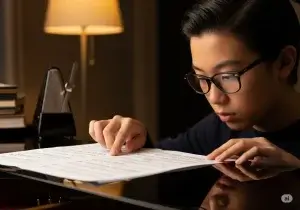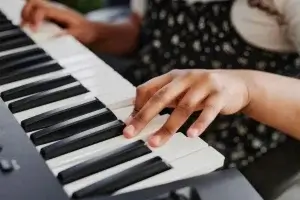Key Takeaways
-
It’s never too late to learn to play piano, and it’s never too late to return to playing. The brain is plastic at any age, and many adult students find success as they take on piano for the first time after childhood.
-
Piano success for the adult beginner comes with specific and attainable goals. They draw on their life experience and use those analytical skills to grasp music theory and song structure.
-
There are so many other cognitive and emotional benefits that come with playing the piano, from memory and focus enhancement to stress relief. Beyond that, it can be a creative outlet and fuel personal expression and fulfillment.
-
Even issues such as coordination or time limitations can be dealt with through patience, focused practice and gradual advancement in study.
-
Quality time matters. Consistency is important. Frequent, shorter practice time is better than occasional, longer sessions. Setting up a practice schedule and utilizing tools such as online piano lessons or apps can help accelerate learning.
-
Setting realistic goals, celebrating milestones, and choosing music you love are essential for staying motivated and enjoying the piano learning journey.
It’s important to emphasize that adults can definitely learn how to play the piano, and that it’s never too late to begin. With specific goals in mind, regular practice, and a positive mindset — along with the right instruction — progress is possible at any age.
Adults benefit from learning piano by increasing concentration, decreasing anxiety, and boosting imagination. Whether you want to play Beethoven, the latest chart topper, or make stuff up, piano is an incredibly satisfying instrument.
As studio teachers, we’ve witnessed successful adults, beginners through advanced, thrive and have fun with their adult musical pursuit.
Can Adults Truly Learn Piano?
The truth is, learning piano as an adult is both entirely feasible and profoundly rewarding. Although many adults think you have to start young, the examples above and the scientific research overwhelmingly supports otherwise. It is possible for adults—even those without any musical background—to realize their creative dreams and find joy in the journey.
1. Debunking the “Too Late” Myth
The truth is, quite a few adults choose to learn piano well into adulthood and find success. Take for instance blues legend Charles Brown, who entered formal piano study as an adult. In fact, research indicates that neuroplasticity—the brain’s ability to mold based on experience—persists into advanced ages.
This ability makes adults excellent at learning new skills. All it takes is a commitment to 30 minutes of practice a day. You’ll be reading music and playing simple songs in as little as six months! The secret is in just getting started without fear, because you are never too old to discover your greatness.
2. Understanding Adult Learning Strengths
Surprisingly, adults actually come to the piano with some really useful tools. Their previous life experiences tend to make them thirsty for deeper explanations of music ideas. Then structured lessons can build on this very strong foundation even more successfully.
Equipped with curiosity and critical thinking, adults can approach lessons at their own speed, allowing for greater understanding. This individualized experience makes sure they’re challenged in a way that fosters real growth without the pressure of being compared to classmates.
3. Why Adults Excel at Piano
Adults do best when they have specific goals – playing classical, or jazz, or pop. Strong analytical skills allow them to understand complex music theory, while rich life experiences fill their expression with emotion and nuance.
Motivation, fueled by potential and personal fulfillment, proves to be their most powerful resource.
4. Neurological Benefits for Adult Learners
Learning piano provides a full brain workout, enhancing memory, concentration and emotional health. Research has shown that adults cognitively reap the rewards of regular practice, doubling up on the mental challenges inherent in learning.
5. Addressing Cognitive and Motor Challenges
Though coordination and memory can be intimidating hurdles, with consistent effort and practice exercises you’ll become more confident with time. With patience and consistent practice, progress comes and adults can have fun along the way.
Why Choose Piano as an Adult?
The piano is the only instrument that offers this contradictory mixture of versatility and accessibility. It’s a great fit for adults looking for a creative outlet and lifelong discovery. Whether you’re drawn to classical compositions, the improvisational nature of jazz, or popular music, the piano seamlessly adapts to a wide range of styles.
This kind of versatility lets adults pursue their own musical interests and figure out what they enjoy the most. Beginners are always enchanted by the layout of the keyboard. This foundational understanding makes learning essential music theory and playing basic melodies so much easier.
For the more accomplished, powerful players find limitless avenues for development and imaginative pursuit. More than its musical versatility, the piano builds community. As an adult you can become a part of local music communities, play in community recitals, or simply get together with friends and family to play duets.
These collective moments of discovery foster a wonderful community and sense of belonging that increases the fun and wonder of learning. What’s more, the piano can become a lifelong pursuit, providing endless opportunities for personal and artistic growth. With flexible learning methods, such as online tutorials, apps, or private lessons, adults can integrate piano practice into their schedules, making it a convenient and rewarding pursuit.
Not just a creative outlet, learning the piano enriches both your emotional health and your brain. Research shows that learning to play an instrument such as the piano helps develop memory, concentration and problem-solving skills.
For adults, this mental stimulation can be particularly beneficial, fostering a sense of mental acuity and relieving stress. Nothing compares to the satisfaction of mastering a new work of music. Creating your own new compositions takes your journey of growth and expression to an entirely new, deeper level.
Crafting Your Piano Learning Journey
There’s so much personal and musical reward in learning piano as an adult. With an intentional plan of action, you can make the experience more fulfilling and inspiring. Set specific goals and try out various genres. By accepting obstacles and savoring your growth, you’ll stay inspired and develop your craft in the best and most rewarding way!
Set Achievable and Specific Goals
Your first step should be setting good, achievable goals to guide your efforts. Decide whether you want to play a favorite song, improve your technique, or tackle advanced pieces by composers like Chopin or Beethoven.
Turn big goals into smaller steps, like learning one song at a time measure by measure. Whenever I work on a repertoire piece, I go deep into the video tutorials. I tend to replay sections over and over until my practice catches up to the demonstration.
Creating a timescale for these mini milestones helps to make progress measurable and helps to keep eyes on the prize. Make rewards for achieving goals. A little treat after finishing a challenging passage makes practicing less of a chore.
Find Your Musical Niche
Being challenged by new genres is the best way to learn what you really love and want to pursue. Challenging yourself with classical, jazz, and pop music will help shape your path of study.
It helps you develop a deeper connection to the music that you’re playing. Whether it’s the lyricism of Debussy or the driving rhythmic force of pop music, personal preferences make practice enjoyable and purposeful.
Embrace Imperfection and Mistakes
Remember that making mistakes is part of the learning process. Learning to see them as opportunities to learn and do better builds grit.
Don’t worry about being perfect—worry about having fun. On a practice routine of one hour per day, I split practice time between scales, sight-reading, and repertoire, maintaining regularity over perfection by avoiding imposing expectations.
Celebrate Small Wins and Milestones
Measuring progress allows you to celebrate wins along the way. Share your progress with friends or family. It’s motivating and holds you accountable.
Even modest performances, such as playing for family members, can boost motivation and enthusiasm.
Effective Practice Strategies for Adults
Consistency is key. Learning piano as an adult can be quite challenging due to time availability. Repeated practice reinforces new skills, creating muscle memory and habits, as well as confidence. Not everyone has the luxury of time, but creating a consistent but adaptable practice schedule can help make practice more focused and productive.
With short, focused sessions and deliberate practice, adults can make real strides advancing their progress, opening up an exciting world of piano learning to adults.
Regular Practice is Key
Practicing for 20-30 minutes daily allows for better focus and retention. Dividing each session into specific objectives, like working on scales or arpeggios or focusing on the trickier parts of a composition, keeps things from feeling daunting.
For instance, if five minutes are spent on scales and five on sight-reading, then technique and fluency are developed simultaneously. Short breaks during practice prevent burnout and keep output high.
Short, Focused Sessions
A regular routine that works with each person’s lifestyle is key. Using a calendar or practice tracker apps like Tonara or MyMusicStaff helps keep students accountable and tracks daily practice.
Flexibility is the name of the game – whether they’re practicing on their lunch breaks or after work, commitment is what matters most. For example, a daily practice commitment of just 10 minutes a day results in 60 hours of practice in a year, resulting in significant progress.
Create a Consistent Practice Schedule
Building piano into existing routines, such as relaxing after work, helps to integrate it into their lives. Apps such as Simply Piano provide valuable targeted practice, but protecting this time holds them accountable for their improvement.
A go-to playlist of all your favorite pieces is another good way to stay motivated.
Optimize Practice for Busy Schedules
Having a specific aim for every practice makes practice time focused and avoids aimless fiddling. Switching up activities keeps kids engaged and on their toes.
Taking time to reflect on each session keeps track of growth and holds you accountable to stay on track.
Use Practice Time Purposefully
-
Online lesson platforms like Piano Marvel
-
Method books such as Alfred’s Basic Adult Piano Course
-
Apps for theory and timing practice
Resources and Tools for Adult Learners
Learning piano as an adult is more accessible than ever before. We’ve gathered a treasure trove of tools and resources all at your fingertips! From online lessons to sheet music and apps, these options cater to varied learning styles and schedules. This makes piano an enjoyable journey at any age.
Online Piano Lessons and Apps
Online lessons provide a level of convenience that is invaluable to adults with hectic lifestyles. Websites such as YouTube have opened the doors for content creators to produce free tutorials made for complete beginners. For those looking to go a bit deeper, premium options such as iReal Pro ($14) let students practice along with customizable backing tracks.
Apps like Ultimate Guitar make it easy to find chord progressions for favorite songs, whether it’s Elton John’s “Rocket Man” or Justin Bieber’s “Sorry.” Through digital resources, students can learn at their own pace, practice whenever and wherever, and strengthen theory with multi-sensory, interactive tools.
Finding a Qualified Instructor
While the video was alarming, a skilled teacher can accelerate progress at warp speed by customizing lessons around each child’s unique instruction. In one example, a featured student with expert mentorship accelerated farther in less time compared to classmates.
Trial lessons and interviews ensure a good fit on both sides. Meeting with multiple prospects before deciding is ideal.
Utilizing Sheet Music and Tutorials
Having varied sheet music helps make practice feel less repetitive. The Faber’s Adult Piano Adventures series offers beginner-friendly pieces, while fake books, like The Easy Christmas Songs Fake Book, simplify holidays with easy arrangements.
Tutorials provide valuable visual and auditory scaffolding for thick, technical pieces.
Develop Your Musical Ear
Purposefully listening to different music genres develops a sensitivity to melody and harmony. While playing by ear, improvisation fits you for creative composition. This kind of skill is most often learned from long-time teachers.
The Role of Technology in Learning
Technology opens new doors to helping educators’ practice soar. Digital tools allow you to track your progress, but in-person communities help keep you motivated to continue.
Apps paired with thoughtful teacher direction can make for an even keel pedagogy app.
Overcoming Common Challenges
With proper guidance and focused practice, adult learners can overcome these hurdles and experience the joy of playing piano. By tackling these with care, we have the opportunity to create a fun, enjoyable learning experience that’s built to last.
Managing Time Constraints
Striking that balance between piano practice and other demands is more than just wishful thinking — it takes purpose. Focusing on YOUR practice time by determining what activities aren’t as important for you to do will begin to clear up your schedule.
Practicing regularly like an appointment will build natural consistency, but setting up some of that practice in short 15-20 minute bursts makes it achievable, rewarding, and focused. For instance, addressing mental rehearsal on a lunch break or learning music theory on the bus can yield increased productivity.
Maintaining a professional practice journal to evaluate our progress and setting short-term goals on a weekly basis can help us stay focused and inspired.
Dealing with Frustration
Frustration is an expected part of the learning process, but it’s avoidable. Whether it’s experimenting with new techniques or tackling a fresh music selection, these little challenges can help restore the spark.
Though they may seem tedious, revisiting foundational skills like your scales or hand coordination only fortify our understanding. Setting new, ambitious, and realistic goals keeps us focused on continually raising the bar, and this patience and persistence is key when progress may come slowly.
Breaking Through Plateaus
Plateaus can be some of the most frustrating times, but they are your best chance to level up. Constantly practicing high stakes performance skills in lower stakes environments, such as performing for a supportive peer, lowers the pressure.
Mental visualization techniques put us in the right mindset, and intrinsic motivation—working for the joy of it instead of just to do something perfectly—fosters confidence. Passing tunes with friends and family inspires happiness and restarts inspiration.
Addressing Performance Anxiety
Preparing for performances is crucial in managing anxiety. The long-term vision and goal setting helps focus our work in the right direction.
Surrounding ourselves with a community of learners creates a supportive network, and discovering the wide world of music opens us up to endless possibilities. With the end still far away, tracking our progress and celebrating smaller milestones help us recognize how far we’re growing.
Staying Motivated Long-Term
Reflect on past successes to understand your learning style. Experiment with group lessons, online tutorials, or private coaching.
Solicit feedback from your teachers about what they find most helpful.
Tailoring Learning to Your Style
Adult piano lessons take a tailored and effective approach, one that easily fits into our transformed everyday lives. We’re not like kids on a rigid weekly lesson plan; we have the ability to research approaches suited to our desire and availability.
Only 20 to 30 minutes of practice a day can lead to significant improvement. On top of that, platforms like Playground Sessions provide you with 24/7 free access to millions of lessons!
Explore Different Learning Methods
Testing different methods and strategies allows us to find out what works best. Simply learning to play familiar tunes by ear opens the door to the exciting journey ahead.
It increases your confidence and ignites your imagination! Rote learning, where we just memorize the easily digested bits, acts in concert to shore up that muscle memory.
When paired with the fundamentals of reading, these provide a strong foundation to build upon. Learning a beloved tune by ear deepens your instinct.
Alongside that, when you read its sheet music, you’re tuning up your technical prowess, thereby amplifying the fun of the learning process.
Playing by Ear and Rote Learning
Blending music theory with practical skills is the best way to deepen understanding. Beginning with fundamentals, like scales and chords, and smoothly transitioning to more complex material, including harmonies, makes theory less intimidating.
Using these ideas not only to things we attend—like the connection of melodies in a Beethoven sonata—deepens our collective development. Understanding how music is put together deepens our experience with works and inspires a lifelong love of music.
Choose Music You Love
Choosing music that connects to us on a personal level makes us want to work harder. Whether we’re diving into great classical works or today’s popular music, it’s always fulfilling to perform music that excites us.
Only love will keep you curious, turning repetitive practice into experiences of discovery and engagement.
-
Log completed pieces.
-
Record progress.
-
Share achievements.
Measuring and Celebrating Progress
Measuring progress as an adult piano student can improve your motivation and help you see where you need to work. By combining recordings, journaling, and sharing music, we can create tangible benchmarks of growth, making the journey both structured and rewarding.
Record Your Performances
Taking video of rehearsal helps us to visually illustrate our process and measure progress from an unbiased viewpoint. By hearing performances back, we can often hear more subtle things we need to work on, like an inconsistent rhythm or imbalance between sections.
For instance, when learning Purcell’s Minuet in A Minor, I would record each part as I worked through it. This helped me identify which transitions required additional support. Eventually, these recordings turn into an archive of your progress, providing a colorful documentation of how much you’ve grown and changed.
Getting feedback from a skilled teacher or fellow performers by sharing recordings with someone we trust can help inject new ideas into our practice.
Keep a Practice Journal
A journal serves as a personal roadmap, tracking challenges, strategies, and milestones. For example, observing when a week was dedicated to learning a new scale or crafting an original short composition underscores hard work and advancement.
Looking back on these posts is a great exercise in mindfulness, bringing awareness to the challenges we’ve faced and grown through. Journaling combined with a visible progress timeline inspires accountability and commitment.
Only taking 10 minutes a day can lead to incredible progress, too—both in understanding and in skill!
Reflect on Your Achievements
Celebrating early milestones, such as writing the first song or having the confidence to perform, reaffirms commitment. Revisiting past goals demonstrates growth and inspires new challenges.
This reflection engenders a greater love and respect for the learning process, fostering a lifelong dedication.
Share Your Music with Others
Whether it’s playing for family, participating in recitals, or sharing recordings/streams online, these experiences help build confidence and connect us to a welcoming, enriching community.
When we invite others into our unfolding musical experiences, learning not only becomes a collective, joyful endeavor,
Start Your Piano Journey Today
While starting piano later in life can seem like a challenging endeavor, adult beginners will find this journey to be truly inspiring and fulfilling. Choosing the most appropriate instrument is a critical first step. Personal preferences are the most important factor in your choice.
Try out pianos like acoustic, digital, and keyboards to find what really speaks to you. No matter what instrument you go for, you’ll want to play test a few in person to hear how they sound and feel. The right piano takes your playing to another level.
It increases learning outcomes, making it the most cost-effective public investment there is. Comfort and playability are no less important than sound; select an instrument that feels natural under your fingers and inspires you to want to play it on the regular.
Choosing the Right Instrument
Finding the right instructor is essential. The most important thing is to find an instructor who specializes in teaching adults. Trial lessons help you get a feel for different personalities and teaching styles, making sure they’re a good fit for what you want to learn.
When good communication and a productive rapport with a teacher are established, it produces an environment where learning is supported and progress flourishes.
Embrace the Learning Process
Becoming great at the piano isn’t a destination, it’s a lifelong journey. By meeting struggles with understanding and forgiveness, we make space for deeper learning. For instance, learning simpler songs first, such as “Mary Had a Little Lamb,” is an excellent confidence builder, and it helps establish a great foundation.
By seeing every time you practice as an improvement in itself, you can make practice fun! Even by practicing one hour a day, split between scales, sight-reading, and repertoire, you will already be well on your way.
Believe in Your Potential
Have faith that you’ll be better at it as you go along. By setting realistic expectations and thinking positively, what starts out as challenges can quickly be turned into milestones. With commitment, your musical journey can last a lifetime, providing a lifetime of enjoyment.







